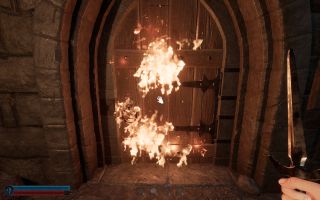Finally, a dungeon crawler with what I've been missing in so many other fantasy adventures: common sense
What Monomyth has isn't actually all that common.

Monomyth's first hour is packed with unobtrusive tutorial pop-ups and helpful advice. Do this to operate a lever. Press this to open my inventory. Jab this key to interact with things. Attack a locked wooden door with my weapon to smash it to smithereens. Set a locked wooden door on fire with the burning torch I'm holding in my hand.
Wait, really? Just like that? Just… bash the weak thing with a massive sword until it breaks, or burn the thing made of highly burnable wood? That's allowed?
Weird, but OK. I made a mental note of this unusual feature and then I went back to picking up healing herbs, fighting giant rats, and carefully working my way through the dark for a while. I behaved like a good gaming adventurer, and in return I made a decent amount of progress and found some interesting new items to equip. Fair. Balanced. Ordinary.
Wrong.
Eventually I came across an open area with a few potential paths forward. The one with enormous wibbly magical barrier was definitely something to save for later. An interesting path to the side nearby had been barricaded off—no lock to pick, no door, so that meant it was a no-go. I knew the rules: I had to find another route. I anticipated exploring a little further and finding a wooden door to smash open, or a steel one controlled by a button or lever, and then carrying on through a linear level, the game and I both pretending this was my discovery and not just subtle hand-holding.




But there was something about that barricade. It was just a few wooden planks, and there was a very tempting path leading away behind it, so what if I just… hit those planks of wood really hard? And what if they immediately splintered under the force of my blows, and I could just walk straight through the hole I'd made?
It was only then that I really understood what Monomyth had been trying to tell me all along—I wasn't supposed to box myself in here. Locked steel doors could be picked open so long as I had the skill to do so, and I could even peer through keyholes if I wanted to make sure they were worth opening in the first place.
The biggest gaming news, reviews and hardware deals
Keep up to date with the most important stories and the best deals, as picked by the PC Gamer team.
Too many games have assured me that if I see a locked door then the very next thing I have to do is go and find the matching key. Or seal. Or gem. Or whatever improbable trinket it is. Yes, even if I'm playing as a reality-bending wizard capable of felling dragons with a wave of their hands or some troubled man brandishing a chainsaw and the door ahead's made of mouldy chipboard. Monomyth doesn't look like a game that would offer the same freedom of huge sandboxes like Baldur's Gate 3 or even Morrowind, but its rules lean much more towards reality than the fantasy construct of the more artificial dungeon crawlers it resembles.
Once I realised that Monomyth didn't expect me to abide by the usual rules—the murky horizon wasn't blocked off by a web of invisible barriers designed to keep me from exploring it the "wrong" way—I knew I needed to recalibrate my thinking.
Treating it as a great King's Field clone would only get me so far. I needed to dig deeper and get myself into an Ultima Underworld mindset. This is an immersive sim with a "realistic" dungeon, something to poke around, observe, and progress through in a messier manner than dungeon crawlers usually allow. I need to avoid noisy surfaces if I want to creep up on (or past) my enemies. If an area's so bright there aren't enough shadows for me to hide in, there's nothing to stop me from magically dousing the lights in the room, or simply pulling lit torches off the walls. If I do decide I'd rather fight, nobody's going to make me fight fair. Forget debilitating debuffs and clever status effects—I just can lure an enemy towards a cliff and kick them over the edge instead.





I feel like I'm MacGyvering my way through an RPG, encouraged to make do with stolen weapons, improvised solutions, and whatever I found on the floor. Coming across a broken staircase isn't an unsubtle sign to hunt around for an official alternative path involving a switch that makes a ladder conveniently drop exactly where I needed it to—it's an invitation to clamber up some boxes and leap from the top of a nearby building, to scrabble around in the dirt and come up with an answer myself.
Not every game needs to be this way: There's a part of me that loves finding carved trinkets for special doors and earning specific power ups, Hollow Knight-style, that'll give me the ability to navigate an impassable area and then explore whatever lies beyond. Rules can be used to create focus, something with a strong narrative and stuffed with cinematic set pieces. But rules were made to be broken too, and they don't need to be big ones to have an impact when they shatter.
Actually being able to jump over a stone bridge's barriers and into the water below, or using my hands to haul myself up a ledge I couldn't quite clear with a jump feels like a revelation. Every area is a playground of possibilities, a new chance to see how I can manipulate this hostile land to my own advantage. If I do get stuck here my first instinct is to think a little more creatively or try something I haven't before, not rush off to type "Iron key dungeons where?" into a search engine. And if my original thinking gets me into trouble, or maybe even kills me off, the walk back from the closest restart shrine stings that much less—it was my fault, after all.
I want more games like Monomyth, and I don't just mean dark fantasy adventures in dangerous places eager to kill me off, either. I want more games to give the fancy cloth physics simulations a rest for a bit and work on something much more impressive instead: adding a little common sense. If I have the strength to take on a god, then I should have the strength to knock through a stained glass window too. I'm tired of carrying lighters, torches, grenades, and fire-breathing potions around only to get stopped by a thick curtain or a wooden door.

I want more games to toss the rulebook in the bin and just trust me. Maybe I won't work out how to get past a clever puzzle—but I know I'll have a lot of fun trying.
Monomyth is currently on Steam in early access, but already well worth playing.

When baby Kerry was brought home from the hospital her hand was placed on the space bar of the family Atari 400, a small act of parental nerdery that has snowballed into a lifelong passion for gaming and the sort of freelance job her school careers advisor told her she couldn't do. She's now PC Gamer's word game expert, taking on the daily Wordle puzzle to give readers a hint each and every day. Her Wordle streak is truly mighty.
Somehow Kerry managed to get away with writing regular features on old Japanese PC games, telling today's PC gamers about some of the most fascinating and influential games of the '80s and '90s.
Most Popular


